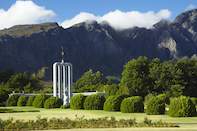First Cape Wine
The first Cape wine in South Africa was made on the slopes of Table Mountain during the tenure of the first Dutch governor, Commander Jan van Riebeeck, who on 2 February 1659 wrote in his diary:

"Today, praise be to God, wine was made for the first time from Cape grapes."
But, the governor was a ship's doctor and the wine was reputed to be more medicinal than mouthwatering: It would take another 30 years and 10 governors before Simon van der Stel created the first wine farm in the verdant Constantia valley, about 12 km south of Table Bay.
As was the case in America's southern cotton states, the prosperity of the Cape's lavish wine estates was founded upon the heinous practice of slave labour. In time that system was abolished under British administration in the 1830s. Groot Constantia wine estate reached its zenith during the Napoleonic Wars when wine had to be imported into Europe and the Cape experienced its first economic boom. By that time the Cape had reaped the harvest of the arrival of French Huguenots and their wine-making acumen.
Huguenot Wine Farms

In 1688 the small colony was invigorated by the arrival of about 200 French Huguenot refugees. These were Protestants who had fled Catholic persecution after the Edict of Nantes had been revoked. They settled in the beautiful Boland, or ‘up-country', valley now named Franschhoek (Dutch for 'French corner') in the Cape Winelands, where they set about building magnificent gabled homesteads and refining the fledgling wine industry at this remote European outpost.
Today these Boland wine farms are among the country's most prosperous agricultural enterprises, especially since the wines themselves have truly come of age, holding their own with the best in the world. The historic estates, set among the fissured crags of the Cape Folded Mountains, are one of the country's most prestigious tourist attractions.